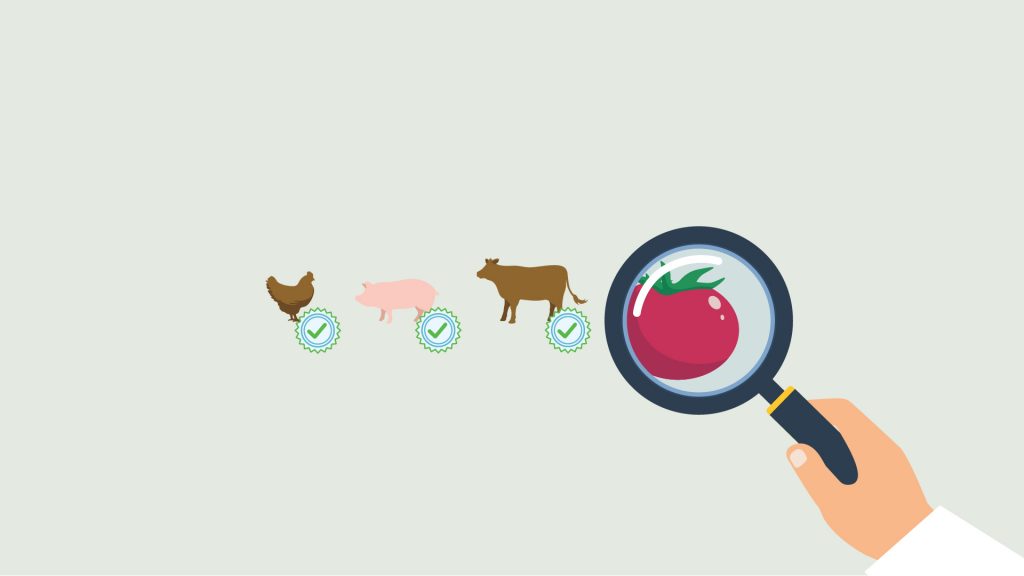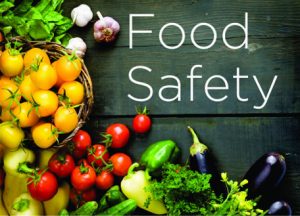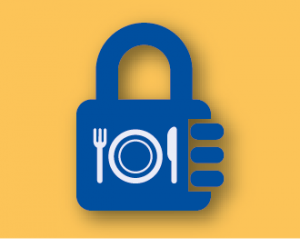“Food is not rational. Food is culture, habit, craving and identity.” – Jonathan Safran Foer
Introduction
Food is the commodity that is most essential to the existence of human race. From the primitive times, humans have been driven by their urge to satisfy their hunger. In the ancient times, human depended wholly on the mercy of the savage nature for food but with the passage of time we have tamed the nature and crafted it to our liking. Compared to that time, inadequacy of food has been reduced to some extent but it is not our only concern regarding food anymore. Due to adopting new and improved methods for procurement of food from the nature and drastic changes in our food intake habits from time to time, food safety has emerged as a major problem. Modern food habits such as preservation, packaging and modification of food products has given rise to concerns of contamination, adulteration and food borne diseases. Ensuring food safety is of immense importance in the modern times. To ensure food safety, procurement, handling, preparation, packaging, storage and inspection of food in a proper way is necessary and all of these are provided by different stakeholders. It is the stakeholders upon whom the responsibility of food safety i.e. safe presence of food in the market, its safe delivery and proper consumption lies. Our laws prescribe the stakeholders their duties and responsibilities so that food safety can be guaranteed.
Concerns with Food Safety in Bangladesh
Food safety has been an Achilles’ heel for our country for a long time. People of Bangladesh are literally surviving on unsafe and adulterated foods. Consumption of unsafe food is causing premature deaths, increase in healthcare costs, diseases, decrease in productivity due to illness, environment pollution etc. Almost the whole population is affected by unsafe food though most of us are unaware about it. In a study in 2013 it was estimated that more than 3 crore people in Bangladesh has been suffering from kidney diseases due to adulterated foods[1]. The extent of adulteration is so appalling that it has been deemed a ‘silent killer’[2]
Constitutional Safeguards
Article-15 of the constitution of Bangladesh provides that the state will secure the basic necessities of life for its citizens which include food. Again article-18 (1) of the constitution states that raising the level of nutrition and improvement of public health shall be regarded as a primary duty of the state. Thus, the concept of food safety has not been overlooked in our constitution. But both of these articles belong to Part-II of our constitution i.e. the fundamental principles of state policy, making them judicially unenforceable[3]. The judiciary of our country, however, has often enforced the rights availed in the Part-II of our constitution by bringing them under the interpretation of article-32, which provides for right to life, a fundamental right guaranteed in the constitution. A shining example of such instance is Dr Mohiuddin Farooque v Bangladesh and others[4], popularly known as Radioactive Milk Powder case. In this case, it was held by Kazi Ebadul Hoque J. that,
“No one has any right to endanger the life of the people which includes their health and normal longevity of an ordinary healthy person by marketing in the country any food item injurious to the health of the people.”[5]
Thus, enforcement of food safety is facilitated by the constitution itself.
Legal Framework
The legal framework of food safety in Bangladesh is currently governed by at least 16 laws, which includes The Food Safety Act, 2013; Penal Code, 1860; Vokta Odhikar Songrokkhon Ain, 2009; Bangladesh Standards and Testing Institution Ordinance, 1985 ; Special Powers Act, 1974 etc. Use of so many laws for a single purpose often leads to confusion among the stakeholders. Even the enforcement authorities fail to identify the law which deals with a issue. The Pure Food Ordinance, 1959 (as amended in 2005) and Pure Food Rules, 1967 were the basic laws regarding food safety in our country. But with the Food Safety Act, 2013 coming into operation, they are to be repealed.
Who are the stakeholders?
A stakeholder can be identified as any individual, end-user or organization having an interest in a particular issue[6]. Therefore, the stakeholders in the food industry are individuals, ventures and agencies that have interest or are engaged with different stages of food business. In the perspective of our country, the stakeholders in the food industry are as follows:
- Food Business Operators.
- Food Regulatory and Enforcement Agencies and
Responsibilities of Food Business Operators
Section-2(9) of Food Safety Act, 2013 defines “food business operator” as any person or entity who runs a food business under the provisions of any law for the time being in force or under any regulation, and is the proprietor of, or responsible to, such business. They are the ones who are responsible for the quality of a food in the market. Needless to say, their responsibilities are greater than other stakeholders. Depending upon the exact role they play in food industry, different personnel in the food business are endowed with unique set of responsibilities. But some responsibilities may be common to everyone in the food business. The responsibilities that are to be discharged by the food business operators can be identified as follows:
Responsibility to abstain from adulteration
Food Adulteration is the biggest threat to food safety in our country. Section-2 (29) of Food Safety Act, 2013 defines adulterated food as food that is mixed, colored, coated, preserved with such amount of ingredients or excessive of such amount of ingredients or different types of cheap ingredients mixed by wholly or partly abstracting the constituents that diminishes the food or nutritive value or is harmful to public health or prohibited in law or to make it look attractive or readily increase its weight to render it injurious to the money or health of the consumer. Section- 272 and 273 of Penal Code, 1860; Section-25C of Special Powers Act, 1974 and Section-42 of Vokta Odhikar Songrokkhon Ain, 2009 provides for punishment for anyone who adulterates food. Chapter V of Food Safety Act, 2013 also contains specific prohibition relating to use of heavy metals, growth promoters etc to stop adulteration. Adulteration of food can occur at any stage of food supply chain and can be done by anyone associated with food business.
Therefore, it is the responsibility of every individual in food business to abstain from adulteration and take precautions to avoid any sorts of adulteration. Failure to do this will earn them punishment.
Withdrawal of Sub-standard or risky or poisonous food
Section-43 of Food Safety Act, 2013 dictates that if any producer, processer, supplier or seller of any food or food ingredient has reason to believe that it does not comply with standard prescribed by law or is contaminated, he has to disclose or circulate this information to the general public and shall take necessary steps to withdraw the said food or food ingredient from market or consumers.
Responsibilities of the supplier and the person who stores
The preamble of Food Safety Act, 2013 states that it is enacted to ensure the rights toward access to safe food for the protection of human health and life. So, abiding by the provision of this act is the legal responsibility of the concerned stakeholders. Section-44 of this act contains provision as liabilities of supplier and for those who are responsible for storage of food and food ingredients. Section-44(2) clearly states which acts will be considered as violation of provisions of this act. Thus, a stakeholder, in order to preserve food safety, is responsible to not indulge in any activity that is a violation of this act. Therefore, pursuant to section-44(2), supplier and individuals who stores have the responsibility to
- Abstain from supplying any food after the expiry date;
- Abstain from storing or distributing food violating precautionary instructions declared by the producers;
- Abstain from erasing any information relating to safety of food, trade symbol or identification mark;
- Provide required traceability information of the producer or of the person from whom the food was received for storage or distribution; or
- Abstain from receiving any food for storage or distribution despite knowing the fact that the food is unsafe.
Responsibilities of the Seller
Similarly, a person who sells food or food ingredient will fulfill his responsibility by not violating provisions of this act. According to section-44(3), a seller has the responsibility to
- Abstain from selling any food or storing it in selling premises after the expiry date;
- Abstain from preserving any food with a view to selling in an unhygienic condition;
- Abstain from erasing any information relating to safety of food, trade symbol or identification mark;
- Provide required traceability information of the person from whom the food was received or of the distributor, or of the origin of the producer; or
- Abstain from receiving any food for storage or sale despite knowing the fact that the food is unsafe.
Responsibilities of Food Regulatory and Enforcement Agencies
The food safety in our country was regulated by several ministries and their sub-ordinate bodies. Co-ordination between ministries and regulatory bodies was very poor. Cabinet being the universal coordinating authority of everything in our country[7], failed due to the over burdening of state activities. Realizing this reality, amendment of Pure Food Ordinance, 1959 in 2005, introduced National Food Safety Advisory Council as the coordinating body regarding food safety in Bangladesh. But with the enactment of Food Safety Act, 2013, National Food Safety Management Advisory Council is responsible for providing direction regarding food safety management. This Council consists of 29 members with Minister of Health being its president. Section-5 of Food Safety Act also provides for formation of Bangladesh Food Safety Authority for carrying out the purpose of the act, i.e. ensure right of access of safe food. Pursuant to the act, BFSA was formed in 2015, to coordinate the activities of various agencies and organizations engaged in controlling food safety and support those entities involved in updating and upgrading the food safety standards or guidelines[8]. According to Section-13(1) of the act, BFSA is responsible, besides coordination, for regulating and monitoring the activities relating to manufacture, import, processing, storage, distribution and sale of food through appropriate scientific methods. Again section-13(2) specifies the duties of BFSA. These may be summarized as follows:
- To scientifically define all the available foods and provide support to the concerned authorities or organization in updating quality parameters, and monitor the implementation of their activities;
- To render necessary support to the concerned authorities or organizations in updating and upgrading the food standards or guidelines to the highest level;
- To provide the concerned authority or organization with necessary support in updating or upgrading the permissible limit at its highest safety level for use of contaminants and other substances in the food product and monitor its implementation;
- To determine permissible limit of use of contaminants through exercise of scientific methods, where it is not determined under any existing law;
- To provide necessary support to the relevant authority or organization in specifying permissible limit of radiation in food;
- To provide necessary support to the concerned authority or organization in formulating and implementing accreditation policies to be followed by the certification bodies for issuing certificate of food safety management system to carry out food business;
- To provide necessary support to the concerned authority or organization in formulating procedural guidelines for accrediting food testing laboratories
- To specify standards and prescribe testing procedures;
- To prescribe the procedure relating to packaging;
- To prescribe the procedure for assessment, analysis, communication and management of probable risk, and to identify increasing risk and introduce regular food alert system; and
- To collect food samples and conduct analysis and exchange of information with the law enforcing agencies.
Section-13(3) also prescribes the steps that BFSA should take in order to fulfill these responsibilities and section-13(4) also empowers them to make regulations in order to carry out these purposes. Besides this, Chapter VII of the act dictates the responsibilities of analyst and different agencies regarding food analysis and testing, while Chapter VIII provides for responsibilities of inspectors regarding inspection and seizure of food.
Courts
Section-64 of Food Safety Act, 2013 provides for Pure Food Court for trial of offences under the act. Power and jurisdiction of the courts will be defined by the government in consultation with Supreme Court. Section-75 of the act also allows the Mobile Court to hold trial for food safety related offences subject to the provision of Mobile Court Act, 2009. The role of Courts in Food safety management is to punish the offender who violates any laws regarding food safety.
Role of Consumers regarding Food Safety
Consumers are those stakeholders who are most affected by violation of food safety laws. Though the responsibility of consumers regarding food safety is more towards themselves than towards law, their role in ensuring food safety is the most vital. Section-76 of Food Safety Act, 2013 gives the consumers the right to seek remedy and reparation for any injury caused to them due to violation of the act. Consumers are legally and morally bound to seek redress, in order to stop practices that go against food safety and assure accountability in the food regulatory system.
Concluding Remarks
Despite having enough laws regarding food safety, proper implementation of those laws has always been a major concern. In fact, the Supreme Court of Bangladesh issued Suo moto orders to the governmental agencies to enforce food safety law in order to save human lives[9], due to the dire situation. Again, abundance of law has also been an obstacle in smooth regulation of food safety measures. At times stakeholders are not aware of their responsibilities due to ignorance of law and at times they ignore and violate laws for their own profit. But when it comes to food, every human being is a consumer. A supplier supplying adulterated food should keep in mind that the food may end up being consumed by one of his family members. That’s why it’s in the best interest of all stakeholders to refrain from activities that endanger the public health. The expectations surrounding government and governmental agencies concerned with food safety is always high. If they can discharge their responsibilities properly, achieving complete food safety will not be impossible.
References:
[1] ‘Adulterants in Food: More than 3 crores suffering from Kidney disease’, The Daily Janakantha (24th August 2014)
[2] ‘Speakers liken food adulteration to genocide’, The Financial Express (5th August 2010)
[3] Article-8(2) of the Constitution of Bangladesh
[4] 48 DLR (1996) 438
[5] Ibid, Para 20
[6] http:/www.mcdowellpurcell.ie (last accessed on 2nd July 2017)
[7] National Taskforce, “Bangladesh Country Paper,” 5[2.1.8]
[8] www.bfsa.gov.bd/index.php/about-us
[9] ‘Enforce Safe Food Law in 2 months-HC asks Government to take steps’, The Daily Star (21st July, 2014)
Arafat Ibnul Bashar
Latest posts by Arafat Ibnul Bashar (see all)
- Food Safety Laws of Bangladesh: A Critical Evaluation - October 20, 2017



